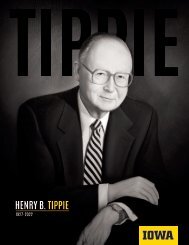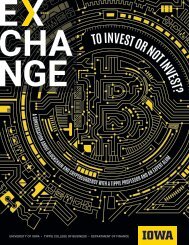Iowa Ledger (2021) - Tippie College of Business
Iowa Ledger is an annual publication for alumni and friends of the Department of Accounting, Tippie College of Business, University of Iowa.
Iowa Ledger is an annual publication for alumni and friends of the Department of Accounting, Tippie College of Business, University of Iowa.
You also want an ePaper? Increase the reach of your titles
YUMPU automatically turns print PDFs into web optimized ePapers that Google loves.
Media coverage <strong>of</strong> corporate wrongdoing is an important part <strong>of</strong> holding executives<br />
accountable, according to a new study from a University <strong>of</strong> <strong>Iowa</strong> researcher, and<br />
shows the value <strong>of</strong> a robust watchdog media.<br />
The study, from Dain Donelson, Henry B.<br />
<strong>Tippie</strong> Excellence Chair and pr<strong>of</strong>essor <strong>of</strong><br />
accounting and law, looked at shareholder<br />
lawsuits brought against firms that<br />
engaged in corporate backdating, a<br />
practice covered by The Wall Street<br />
Journal (WSJ) in a Pulitzer Prize-winning<br />
series <strong>of</strong> stories published in 2006 and<br />
2007. The WSJ investigation was based on<br />
a 2005 study by <strong>Tippie</strong> Finance Pr<strong>of</strong>essor<br />
Erik Lie, who was named one <strong>of</strong> the TIME<br />
100 for his uncovering <strong>of</strong> the stock option<br />
backdating scandal.<br />
Lie’s study found a significant number <strong>of</strong><br />
firms had been backdating stock options<br />
or misrepresenting the option grant<br />
dates to when the stock was selling for a<br />
higher price so that the option was more<br />
valuable. The practice violates federal<br />
securities law. The WSJ investigation that<br />
followed found backdating to be even<br />
more widespread and led to numerous<br />
shareholder lawsuits against firms that<br />
gave backdated options to their managers,<br />
as well as investigations by federal<br />
regulatory agencies.<br />
Donelson says the WSJ series increased<br />
litigation probability by an economically<br />
meaningful amount. For example, being<br />
named by the newspaper increased case<br />
filing likelihood in the same quarter by<br />
45%, and by 60% overall.<br />
The study also found a market impact <strong>of</strong><br />
the newspaper’s coverage, as stock prices<br />
<strong>of</strong> companies named in the investigation<br />
fell up to 5% in the week following<br />
publication.<br />
Donelson says the coverage led to more<br />
lawsuits in part because the stories<br />
brought attention <strong>of</strong> the wrongdoing to<br />
shareholders and attorneys. Many <strong>of</strong> the<br />
lawsuits filed against firms cited the WSJ’s<br />
investigation in their filings.<br />
But the coverage did more than just shine<br />
a public light on the backdating. Donelson<br />
says it also helped plaintiff’s lawyers by<br />
essentially acting as an expert witness,<br />
prompting companies that engaged in<br />
backdating to realize they needed to<br />
settle. In the backdating lawsuits, he says<br />
plaintiff’s lawyers “outsourced” much<br />
<strong>of</strong> their investigation to The Wall Street<br />
Journal and other media outlets that<br />
covered the scandal.<br />
To discover if the WSJ’s coverage was<br />
responsible for the litigation, Donelson<br />
and his research team compared the<br />
outcome <strong>of</strong> those firms named in news<br />
coverage to those firms that engaged<br />
in backdating but were not publicly<br />
identified by media. They found 88%<br />
<strong>of</strong> firms identified in the newspaper’s<br />
investigation were sued, compared to only<br />
4% that the WSJ didn’t identify.<br />
Donelson says the results <strong>of</strong> The Wall<br />
Street Journal’s investigation show the<br />
need for a vigilant media to act as a check<br />
on corporate misbehavior. •<br />
Of firms that engaged in<br />
backdating, 88% that were<br />
identified in the newspaper’s<br />
investigation were sued,<br />
compared to only 4% that the<br />
WSJ didn’t identify.<br />
“The results <strong>of</strong> The Wall Street<br />
Journal’s investigation show the need<br />
for a vigilant media to act as a check on<br />
corporate misbehavior.”<br />
UNIVERSITY OF IOWA TIPPIE COLLEGE OF BUSINESS 9

















